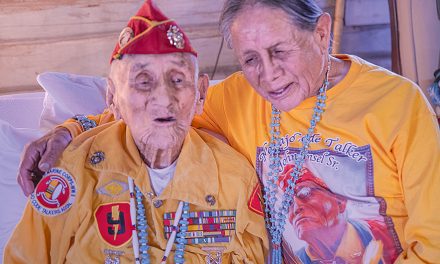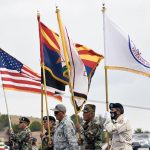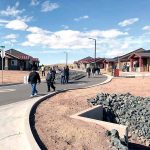Letters: Use black Charger for patrol
According to Navajo Times, dated Oct. 3, 2019, “Delegates question chief’s use of black Charger.” Foremost, thank you for your service, Navajo Nation Police officers. “Fast cars,” it’s black, but unmarked, according to the picture taken. It’s show-and-tell, but using it for travel to attend meetings? That’s uncalled for, according to what I’ve read. As I was traveling to two different locations and two different days, people were speeding to Chinle in the evening after 5 p.m.
The next day as I left for Window Rock in the morning, before 8 a.m., I left early both days (JV football game and Veterans Administration by way of Election Office), looking at the dashboard clock with plenty of time to get to my destination and a good night sleep, people were speeding. Where was the black Charger?
The vehicle should have been used for patrol and tickets should have been issued plus taking time out to appear in court to testify. Talking about speeding, Highway 264 in Ganado, posted speed limit is 40 mph in the school zone, but people are speeding, including tribal vehicles, vendors, truckers, fuel tankers, including federal government vehicles. Are you in a rush to get to your destination? The black Charger needs to be used wisely: patrol.
I support your upgrade. Buy more for the five agencies and for patrol in between ’264, ’491, ’191, ’160, ’371, and ’89. More speeding tickets are warranted (no warning). Warning has been out there long enough.
Steven Kee
Ganado, Ariz.
Board unfairly attacked Kaibeto principal
Reading the Navajo Times about the impossibility of firing a principal (“Wearing out her welcome,” May 23) makes me proud that this person, Mrs. Yazzie, since her early 30s refuses to be stepped on by people with small minds and I am sorry to say but that is exactly what I think of Kaibeto Boarding School’s school board.
Mrs. Yazzie was my 8th-grade language arts teacher at Tuba City Boarding School and without her I really don’t think I would be where I am today. She has been a powerful, positive influence in my life. In 1985-86 school year, Mrs. Yazzie was a brand new “bilagaana” teacher at Tuba City Boarding School and at first I gave her a hard time, but as months passed she proved to be an advocate for students and children in general.
She treated our classroom with so much compassion that we as a class knew she had a passion for her career choice. During my teenage years, I came upon an obstacle that my own family shunned me for and Mrs. Yazzie stepped in and literally saved me. “God-fearing person,” that is a term that describes her.
The only entity that scares her and she obeys is our Lord Jesus Christ. Her routine of praying every day before anything else has been a ritual I’ve seen her practice and she has made this a foundation for her own children. The community of Kaibeto should be grateful to have a leader that has devoted more than five years of her expertise upon the school.
Nowadays, we hear of so much corruption in reservation schools that I can’t help but think the school board is picking on Mrs. Yazzie just because for once someone is making employees accountable for student learning and not once have I heard she is misusing funds or on unnecessary travel. School employees are known to pick sides in the school culture.
Even students know who hangs out with who and who is truly there for them and who is there for a paycheck. I feel that the employees who used to have it easy are the ones who report to the school board what they are disgruntled about. In the paper it states that “teachers were reporting she had ‘goonies’ whose job was to spy on the other teachers and report back if anyone said anything bad about her or the school.”
To this I reply, doesn’t that practice happen everywhere? Sounds like an episode out of “Game of Thrones” and so unlike Mrs. Yazzie.
My credentials for writing this opinion-based letter are first of all, Mrs. Yazzie was my teacher. I’ve worked at five Navajo Reservation schools and three off-reservation schools as an elementary school teacher.
Sherry Yazzie
Tuba City, Ariz.
Honor indigenous people by fixing road
Monday was Indigenous Day 2019, a day to honor Native Americans in their dwelling places like the community of Shiprock. We want to be recognized as honorable Diné individuals, but do we really honor one another? There is an ongoing situation that could be construed as not honorable — the lack of road maintenance, repair, and/or road construction of the Bluff Road.
In Shiprock, we have at least four road departments: Navajo Department of Transportation, BIA Roads, New Mexico Department of Transportation, and Navajo Engineering Construction Authority. Any one of these organizations could work on fixing the Bluff Road. Our local chapter president could easily pick up the phone and arrange for some type of road maintenance, repair, or construction. What will it take to prod him? There are repeated monthly meetings that are only that.
People gather and listen to what is on the agenda, but nothing gets done. Where is the leadership in that? Chapter officials have titles, but what do they mean? Are there job descriptions for each? Question for the elected officials: What did you get elected for? Who will fix Bluff Road?
Wilford R. Joe
Shiprock, N.M.








 Highway 264,
Highway 264, I-40, WB @ Winslow
I-40, WB @ Winslow